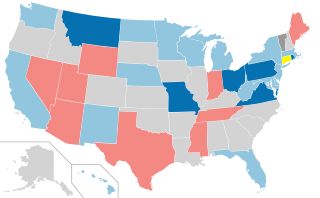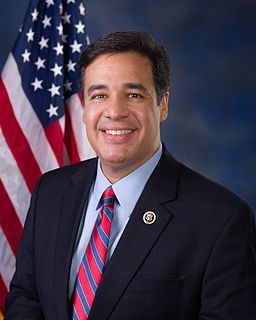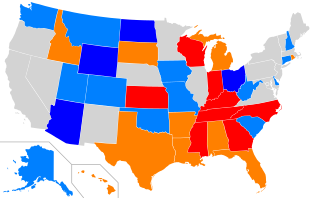Related Research Articles

Steny Hamilton Hoyer is an American politician and attorney serving as the U.S. representative for Maryland's 5th congressional district since 1981 and as House Majority Leader since 2019. A Democrat, Hoyer was first elected in a special election on May 19, 1981. As of 2022, he is in his 21st term as a member of the House. The district includes a large swath of rural and suburban territory southeast of Washington, D.C. Hoyer is the dean of the Maryland congressional delegation and the most senior Democrat in the House.

John A. Sullivan is an American politician who was the U.S. representative for Oklahoma's 1st congressional district from 2002 to 2013. He is a member of the Republican Party.

Addison Graves "Joe" Wilson Sr. is an American politician and attorney serving as the U.S. representative for South Carolina's 2nd congressional district since 2001. A member of the Republican Party, his district stretches from Columbia to the Georgia–South Carolina border. He served as the South Carolina state senator from the 23rd district from 1985 to 2001.

David Nicola Cicilline is an American lawyer and politician serving as the U.S. representative for Rhode Island's 1st congressional district since 2011. A member of the Democratic Party, he was the 36th mayor of Providence from 2003 to 2011, the first openly gay mayor of a U.S. state capital.

The 2006 Ohio gubernatorial election was held on November 7, 2006, and was a race for the Governor and Lieutenant Governor of Ohio. Incumbent Governor Bob Taft could not run for re-election, because Ohio governors are limited to two consecutive terms in office. The election was held concurrently with a U.S. Senate election.

John Peter Spyros Sarbanes is an American lawyer and politician who is the U.S. representative for Maryland's 3rd congressional district, serving since 2007. He is a member of the Democratic Party. The district includes the state capital of Annapolis, central portions of the city of Baltimore, and parts of Anne Arundel, Howard, Montgomery, and Baltimore counties.

The 2006 United States elections were held on Tuesday, November 7, 2006, in the middle of Republican President George W. Bush's second term. Democrats won control of both houses of Congress, which was the first and only time either party did so since the 1994 elections. These elections were widely categorized as a Democratic wave.

The 2007 Louisiana gubernatorial election was held on October 20. The filing deadline for candidates was September 6. On the day of the election, all 12 candidates competed in an open jungle primary. Bobby Jindal won the election with 54%. This was the first time since 1967 in which the winner of a Louisiana gubernatorial election was of the same party as the incumbent president.
Rasmussen Reports is an American conservative polling company founded in 2003. The company engages in political commentary and the collection, publication, and distribution of public opinion polling information. Rasmussen Reports conducts nightly tracking, at national and state levels, of elections, politics, current events, consumer confidence, business topics, and the United States president's job approval ratings.

The 2010 United States elections were held on Tuesday, November 2, 2010, in the middle of Democratic President Barack Obama's first term. Republicans ended unified Democratic control of Congress and the presidency by winning a majority in the House of Representatives.
The Quinnipiac University Poll is a public opinion polling center based at Quinnipiac University in Hamden, Connecticut. It surveys public opinion in Connecticut, Florida, Georgia, Iowa, Minnesota, New York, New Jersey, Pennsylvania, Ohio, Texas, Virginia, and nationally. The poll is unaffiliated with any academic department at the school and is run by Quinnipiac's public relations department.

The 2010 congressional elections in Indiana were held on November 2, 2010, to determine who would represent the state of Indiana in the United States House of Representatives. Representatives are elected for two-year terms; those elected served in the 112th Congress from January 2011 until January 2013, except for the winner of the 3rd District's special election, who will serve the few remaining weeks of the 111th Congress.

Raúl Rafael Labrador is an American lawyer and politician who was the chair of the Idaho Republican Party. He previously served as a U.S. representative for Idaho's 1st congressional district from 2011 to 2019. He also represented the 14B district in the Idaho House of Representatives from 2006 to 2010. Labrador opted not to seek another term in Congress to run for governor of Idaho in the 2018 election; he lost the Republican primary to Idaho Lieutenant Governor Brad Little.

Voter ID laws in the United States are laws that require a person to provide some form of official identification before they are permitted to register to vote, receive a ballot for an election, or to actually vote in elections in the United States.

The 2018 United States elections were held on Tuesday, November 6, 2018. These midterm elections occurred during Republican Donald Trump's term. Thirty-five of the 100 seats in the United States Senate and all 435 seats in the United States House of Representatives were contested. Thirty-nine state and territorial governorships as well as numerous state and local elections were also contested.
Voter impersonation, also sometimes called in-person voter fraud, is a form of electoral fraud in which a person who is eligible to vote in an election votes more than once, or a person who is not eligible to vote does so by voting under the name of an eligible voter. In the United States, voter ID laws have been enacted in a number of states by Republican legislatures and governors since 2010 with the purported aim of preventing voter impersonation. Existing research and evidence shows that voter impersonation is extremely rare. Between 2000 and 2014, there were only 31 documented instances of voter impersonation. There is no evidence that it has changed the result of any election. In April 2020, a voter fraud study covering 20 years by the Massachusetts Institute of Technology found the level of mail-in ballot fraud "exceedingly rare" since it occurs only in "0.00006 percent" of individual votes nationally, and, in one state, "0.000004 percent — about five times less likely than getting hit by lightning in the United States."

A general election was held in the U.S. state of Illinois on November 6, 2018. The elections for Illinois's 18 congressional districts, Governor, statewide constitutional officers, Illinois Senate, and Illinois House were held on this date.

In the United States, Obama–Trump voters, sometimes referred to as Trump Democrats or Obama Republicans, are people who voted for Democratic Party nominee Barack Obama in the 2008 or 2012 presidential elections, but later voted for Republican Party nominee Donald Trump in 2016 and 2020. Data shows that in 2016, these voters comprised roughly 13% of Trump voters. In 2012, this segment of voters made up 9% of total Obama voters. Seven percent of 2012 Obama voters did not vote at all in 2016, and 3% voted for a third party candidate. While some analysts consider Obama–Trump voters to have been decisive in Trump's 2016 victory, others have disputed this conclusion.

The 2018 election for California's 21st congressional district was held on November 6, 2018, during the 2018 elections to the U.S. House of Representatives to determine who would represent California's 21st congressional district. The district, centered in the San Joaquin Valley, represents parts of Fresno County, Kern County, Kings County and Tulare County. It was represented by the incumbent, Republican David Valadao, since 2013.
References
- ↑ Mackey, Robert (2017-01-26). "Just 5 Clicks on an Internet Survey Inspired Trump's Claim Millions Voted Illegally". The Intercept. Retrieved 2017-12-21.
- ↑ "Did millions vote illegally in the US?". BBC News. 2017. Retrieved 2017-12-21.
- ↑ Vavreck, Lynn; Rivers, Douglas (2008-11-01). "The 2006 Cooperative Congressional Election Study". Journal of Elections, Public Opinion and Parties. 18 (4): 355–366. doi:10.1080/17457280802305177. ISSN 1745-7289.
- ↑ "Welcome to the Cooperative Congressional Election Study!". Cooperative Congressional Election Study website. Retrieved 2017-12-21.
- ↑ "Homepage". Cooperative Congressional Election Study website. Retrieved 2017-12-21.